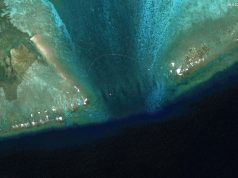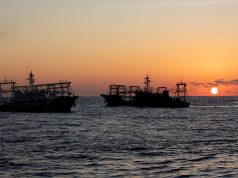MANILA, Philippines — (UPDATE – 10:59 a.m.) Any potential deals between Manila and Beijing on energy exploration in the South China Sea should be agreed with a company and not the Chinese government, presidential spokesman Harry Roque said on Thursday, March 1.
But an opposition lawmaker cautioned government against accepting China’s reported offer for joint exploration in the disputed sea lanes until the Supreme Court rules on a 10-year old petition against any such activity.
“It falls upon the wisdom of the Supreme Court to untangle this legal Gordion knot … to clear the doubts of all concerned parties as to the conduct of exploring and exploiting the natural resources within our seas,” House Resolution No. 1739 filed by Magdalo party-list Representative Gary Alejano urged.
The resolution refers to the 2008 petition of Bayan Muna asking the Supreme Court to void the Tripartite Agreement for Joint Marine Seismic Undertaking in the West Philippine Sea between the Philippine National Oil Co., China National Offshore Oil Corp., and Vietnam Oil and Gas Corp.
The 2005 JMSU covers 80 percent of the Kalayaan Group of Islands and the Reed Banks.
China claims most of the South China Sea, a key route in global trade and resource-rich territory whose parts are subject to competing claims with Brunei, Malaysia, Taiwan, Vietnam and the Philippines.
“We might enter into an agreement with a Chinese-owned corporation, not the Chinese state itself,” Roque told ANC news channel.
The Philippines and China last month agreed to set up a special panel to work out how they can jointly explore oil and gas in part of the South China Sea that both sides lay claim without having to address the touchy issue of sovereignty.
Pursuing a joint project would be extremely complex and sensitive, as sharing oil and gas reserves could be seen as endorsing other countries’ claims.
“We are not entering into a sovereign agreement for exploration. It will be an agreement, if we do, between two corporate entities,” Roque said.
The Philippines suspended exploration in the Reed Bank in 2014 as it pursued international arbitration over territorial disputes with China.
In 2016, the Permanent Court of Arbitration in the Hague invalidated China’s claim over most of the South China Sea, though Beijing refused to recognize the ruling, which spelled out the Philippines’ sovereign rights to access offshore oil and gas fields, including the Reed Bank, within its 200 mile Exclusive Economic Zone.
Negotiations are ongoing with a Chinese state-owned company, Roque said, declining to name the entity.
The Philippines, China’s CNOOC Ltd, and state-owned PetroVietnam jointly surveyed the Reed Bank in 2003 to 2008.
“This will now actually entail joint exploration and possible exploitation of natural resources,” Roque said.
However, there are doubts a joint agreement will be approved because China does not favor activities that they have to undertake jointly with other people, Roque said.
Ties with China have warmed under Duterte, who has put aside territorial disputes with Beijing in exchange for trade opportunities and financing in key infrastructure projects.
But Alejano, a former military officer, said: “Given the seeming enthusiasm of the Duterte administration in pursuing a joint exploration with China, I urge the Supreme Court to hasten the resolution of the petition.”
“A final ruling of the Supreme Court regarding the constitutionality of the JMSU would be most vital in determining the Philippine’s foreign policy direction, its subsequent dealings with China and any other foreign states seeking to partner for marine exploration and resource exploitation, and the policy directives of the Congress,” he said.
The petition against the JMSU names former President Gloria Macapagal-Arroyo, the Secretaries of Foreign Affairs and of Energy, the PNOC Exploration Corp. and the PNOC as respondents.
“I must remind the Duterte administration that the issues regarding the JMSU have no final word yet,” Alejano said. “To use an unresolved case as precedent does not lend assurance on the legality of the joint exploration they intend to pursue now.”
“I believe that the best course of action is to wait for the resolution of the JMSU petition and clear first the doubts as to the proper conduct in exploring and exploiting the resources within our seas,” he added.









